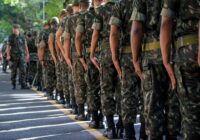In an interview with The New York Times, former US Chief of Staff John Kelly deemed Trump an authoritarian who “falls into the general definition of fascist.” A retired general, Kelly is just one of many high-ranking veterans who warned the public that a Trump presidency would pose a threat to American democracy. At the same time, other veterans have taken a stand against the government and come out in support of radical leaders like Trump, who now dominates the American political system.
The Defense
Some of Trump’s most prominent critics are General Mark Milley, former Chairman of the Joint Chiefs of Staff, Dr. Mark Esper, former Secretary of Defense, and James Stavridis, retired Navy admiral and commander of NATO forces. Many of these distinguished military leaders and naval commanders have labelled Trump a belligerent, feckless and uninformed commander and chief. Worse, some worry that in his second term, Trump may invoke the Insurrection Act to mobilize the military against domestic critics.
With Trump’s victory, some of these officers, particularly those who served in Afghanistan, may be recalled to active duty or court-martialed. This effort is likely to be led by Pete Hegseth, a right-wing ideologue and recently confirmed Secretary of Defense. Hegseth, previously a co-host of a Fox News television show, served as a national guardsman and saw combat in Afghanistan.
Before taking office, Hegseth promised to fire army officers who’ve articulated support for “woke” ideas. The current Chair of the Joint Chiefs of Staff, General Charles Q. Brown, Jr., may be one of many veterans on the chopping block.
The Offense
While some prominent retired military leaders have become highly visible defenders of America’s democratic system, there is another side to the story. The US military does not solely produce “woke” defenders of democracy — former servicemen have also turned into domestic threats to the nation that they allegedly worked to defend.
Consider the cases of Timothy McVeigh, Terry Nichols and Michael Fortier, three servicemen-turned-domestic terrorists. Conspiring with Nichols and Fortier, friends from the Army, McVeigh set off a truck bomb in front of a federal government building in Oklahoma City on April 19, 1995. The attack killed 168 people, one of the worst single acts of domestic terrorism in American history. All three veterans harbored an abiding hatred of the US government.
Texas-born Louis Beam had a similar fall from grace. A Vietnam War Veteran who manned a helicopter gunship, Beam developed strong racist ideas in the Army. Following the assassination of Dr. Martin Luther King in 1968, racial tensions among white and black soldiers intensified. When Beam was discharged he possessed deep rooted racial animosity towards not only the Vietnamese, but also minorities back home. He went on to become a key figure in the Ku Klux Klan, Christian Identity and Aryan Nations movements and even threatened war on the US government.
Veterans among the far-right
Today, far-right militia groups such as the Proud Boys, Three Percenters and Oath Keepers seek to recruit members among both active and retired Army personnel. Historically, both veterans and those on active duty have leaned Republican. In both the 2020 and 20204 elections, around 60% of veteran voters cast a ballot for Trump, according to a poll conducted by Pew Research Center.
Far-right recruitment efforts have achieved some success. Among those charged for participating in the attack on the Capitol, active and former members of the US Military represented a disproportionately large group. Stewart Rhodes, founder and former leader of the Oath Keepers, was an honorably discharged Army veteran. Sentenced to 18 years in prison after having been convicted of sedition for his involvement in the January 6 insurrection, Rhodes walked away free in January following Trump’s sweeping pardons.
To combat this right-wing shift among those on active duty, the Department of Defense established policies aimed at eliminating political extremism from their ranks. Under the new Trump administration, it remains to be seen how vigorously these policies will be pursued.
As Trump continues his barrage of rapidly unleashed executive orders and structural changes to the government, it is impossible to predict how his time in office will influence his veteran supporters. Voices on both sides of the fight, veterans for democracy and veterans for Trump — a divide which is becoming increasingly prevalent — have been placed on the backburner as the country struggles to cope with the intensity of Trump’s first few weeks in office. With his second term heralding unprecedented uncertainty across the nation, only time will tell how these next four years will shape veteran voices and their place in America’s future.
The views expressed in this article are the author’s own and do not necessarily reflect Fair Observer’s editorial policy.
Support Fair Observer
We rely on your support for our independence, diversity and quality.
For more than 10 years, Fair Observer has been free, fair and independent. No billionaire owns us, no advertisers control us. We are a reader-supported nonprofit. Unlike many other publications, we keep our content free for readers regardless of where they live or whether they can afford to pay. We have no paywalls and no ads.
In the post-truth era of fake news, echo chambers and filter bubbles, we publish a plurality of perspectives from around the world. Anyone can publish with us, but everyone goes through a rigorous editorial process. So, you get fact-checked, well-reasoned content instead of noise.
We publish 2,500+ voices from 90+ countries. We also conduct education and training programs
on subjects ranging from digital media and journalism to writing and critical thinking. This
doesn’t come cheap. Servers, editors, trainers and web developers cost
money.
Please consider supporting us on a regular basis as a recurring donor or a
sustaining member.
Will you support FO’s journalism?
We rely on your support for our independence, diversity and quality.









Comment